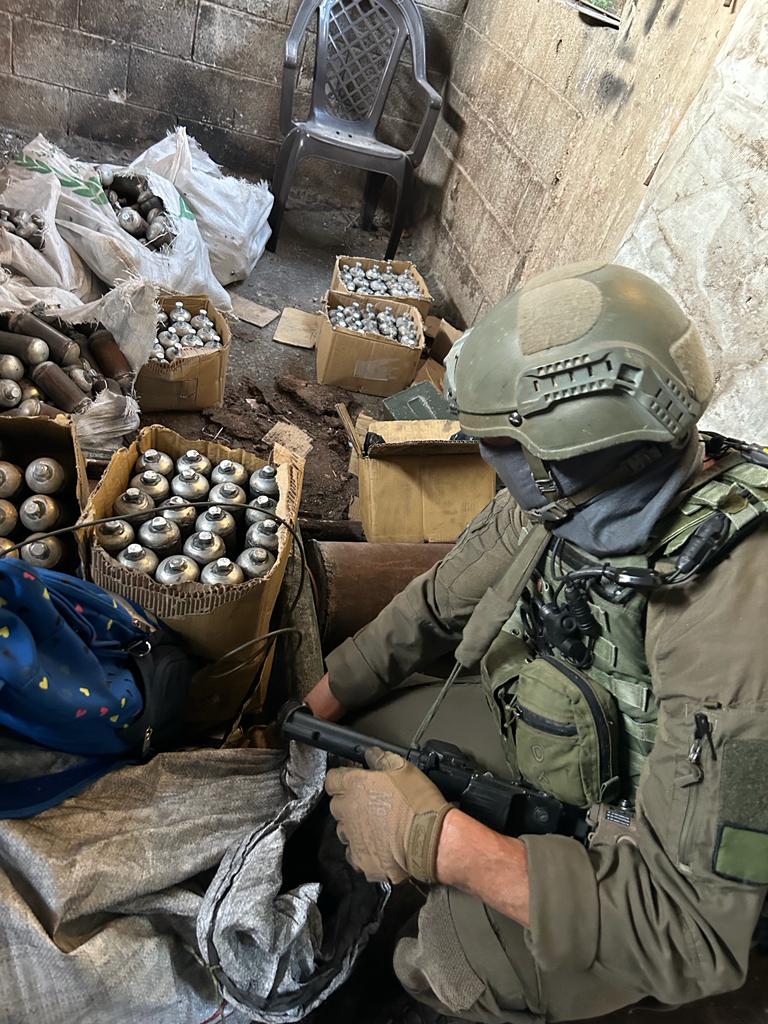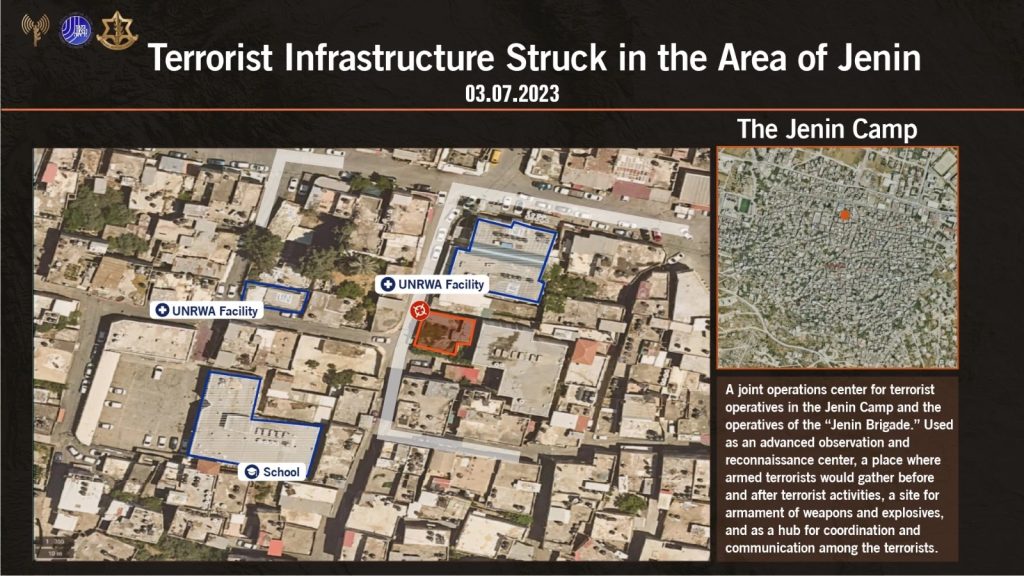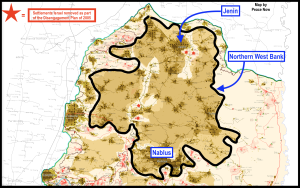FACT SHEETS
Fast Facts: “House and Garden” – An IDF operation targeting terror infrastructure in Jenin
July 4, 2023 | Ahron Shapiro

In the early morning hours of July 3, 2023, the Israel Defense Forces conducted a “Brigade-level raid” including over 1,000 soldiers and border police, into the Palestinian town of Jenin, focusing primarily on the UNRWA refugee camp in the area (also named Jenin). The IDF said the raid, named “Operation House and Garden,” was launched as part of its efforts to neutralise a growing terrorist infrastructure that has greatly increased its activity since early 2022, with militants based in Jenin launching dozens of deadly terror attacks against Israeli civilians and security forces, both inside Israel’s Green Line and in the West Bank.
The operation, which includes air support and coordinated operations across several Israeli military and security agencies, is the largest raid in the Jenin area since 2002, when Israeli forces fought a bloody battle in the town at the height of the Second Intifada.
As of July 4, ten Palestinians had been reported killed as a result of intense firefights that broke out between the IDF and heavily armed Palestinians on the first day of the operation, with at least eight of them confirmed to be armed fighters. Numerous terror suspects reportedly barricaded themselves in a mosque. Some 3,000 Palestinians were also reported to have temporarily fled the refugee camp to escape the fighting.

What were the IDF’s targets?
The IDF’s targets in the operation included: a joint terror command post which had served as a war room of sorts for multiple terror organisations; weapons production and improvised explosive device (IED) and rocket-crafting and storage facilities; and arresting scores of fugitive terrorists.
As part of the operation, IDF bulldozers were sent to tear up roads leading to the combat area as a precaution against mines and IEDs ahead of armoured personnel carriers (APCs). On June 19, seven IDF soldiers were injured in an ambush in Jenin when a powerful IED exploded under their vehicle, and rescuers then came under heavy gunfire.
On the morning of July 4, IDF Spokesperson Rear Admiral Daniel Hagari updated the Israeli media with the following statement:
“So far our forces have arrested 120 terrorists for questioning since the beginning of the operation. We have about 10 more marked destinations in the centre of Jenin. The opening blow shook them – there is no point in the refugee camp where we did not act. The Chief of Staff [Maj. Gen. Herzl Halevi] came in yesterday around 8pm and was with the forces for two hours in the commando force’s armoured personnel carrier and was with them inside the area [of combat]… We set ambushes, [however,] there were no significant encounters [overnight].”
In other remarks, Hagari commented on the timing of the operation, which he said was planned months in advance – thus implicitly suggesting it was not a result of political pressure from members of the current Israeli Government or in response to any one terror attack.
Hagari told a press briefing that “We have been preparing for months to address the issue of the Jenin refugee camp, and we chose the current timing due to constraints of other operations, higher-level strategic decisions and the relevant intelligence assessment for the operation. Weather conditions were also a consideration.”
According to Jerusalem Post reporter Yonah Jeremy Bob, as of the morning of July 4, “IDF drones have already destroyed 20 targets, while the IDF commandos, Maglan, paratroopers, regular Menashe infantry, Shin Bet (Israel Security Agency) forces have neutralized a variety of other targets, including a concealed hiding spot of a large cache of weapons under a mosque.”
Bob wrote that the apparent decision of most of the remaining wanted suspects to hide, rather than attack or surrender to Israeli forces, could mean the IDF may be compelled to end the operation without fully completing its objectives of completely dismantling all terrorist infrastructure in the camp.
Earlier, on July 3, Hagari discussed the deteriorating security situation leading to the raid. Hagari noted that in the last two years, 50 shooting attacks had originated in Jenin and that 19 terrorists had fled to Jenin, adding, “Jenin will no longer be a city of refuge for terrorists.”
Hagari also emphasised that the operation is not against the Palestinian Authority, stating “We are strict about coordinating with the Palestinian security organisations as much as possible.”
PM Netanyahu: Operation will last “as long as it takes”; Opposition leaders back raid
On July 3, at a US Embassy event celebrating US Independence Day, Israeli Prime Minister Binyamin Netanyahu defended the decision to launch the military operation in Jenin.
“In recent months, Jenin has become a safe haven for terrorism, and from that haven came vicious attacks against Israeli men, women and children,” Netanyahu said. “Israeli soldiers are doing everything to avoid civilian casualties as Israel does everything to exercise its right to self-defence.”
Netanyahu said that the operation “will continue as long as it takes to complete the mission.”
Israeli Opposition Leader Yair Lapid and fellow opposition party head Benny Gantz – who is currently leading in polls as Israel’s preferred leader, even ahead of Netanyahu – both expressed their support for the military operation, while at the same time demanding that the Government stop its efforts to unilaterally pass parts of a controversial judicial reform plan.
“Whoever threatens Israeli citizens will end up in prison or a grave,” Gantz told Israeli media, adding, “We all back the security forces and IDF, trust them to carry out the mission, and pray that they come home in peace. We, as a responsible opposition, back the Government in its fight against terror.”
Palestinian Authority: We’re ending all contact with Israel
In Ramallah, the leadership of the Palestinian Authority (PA), which in January announced it was halting all security cooperation with Israel in response to a previous raid to arrest wanted terrorists in Jenin, told reports on July 3 that it was now severing all contact with Israel, according to the Jerusalem Post.
Essential Background
Where is Jenin?
Jenin (est. pop. 67,000) is the northernmost city in the West Bank, about five kilometres south of the pre-1967 armistice line {also known as the “Green Line”) and only 15km south of the Israeli city of Afula (pop. 60,000).
Who governs Jenin?
Under the Oslo Accords, Jenin was allocated to Area A – which means that it is, by signed agreement, under full civil and security control by the PA. [Area B is under full Palestinian civil control and joint Palestinian and Israeli security control, while Area C is under full Israeli military governance and security control].
Jenin is part of the Jenin Governate – one of the 16 Governates of the PA. However, in recent years, whether by intention or otherwise, the PA’s security forces have withdrawn from Jenin completely and weakened their presence considerably in nearby Nablus (est. pop. over 200,000) – the largest city in the Northern West Bank. UN-run refugee camps [dating back to the 1948 war] within the environs of Jenin and Nablus, which were the main nexus of terrorist activity during the Second Intifada (2000-2005), have once again become saturated by armed gangs and terrorist organisations.
What is special about the northern West Bank, and how is it that so many recent Palestinian terror attacks originate from there?
As part of Israel’s 2005 Disengagement Plan, Israel withdrew from its only two settlements in the Jenin region and its only two settlements between Nablus and Jenin. This evacuation of settlements created the largest settlement-free territory within the West Bank, comprising the vast majority of the Jenin Governate and large parts of the Nablus, Tubas and Tulkarem Governates (see graphic).
While it’s true that not all of this area is in Area A, generally speaking, in times of reduced tension, there is minimal IDF presence in this region compared to the rest of the West Bank, something terrorists have taken advantage of in order to plan and execute attacks as well as successfully escape back into the northern West Bank towns afterwards.






